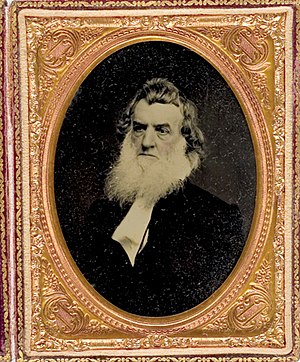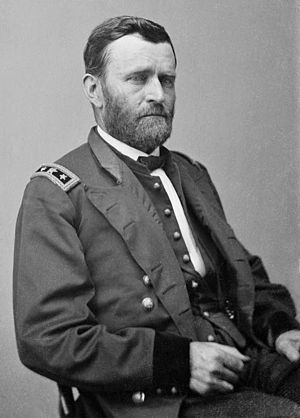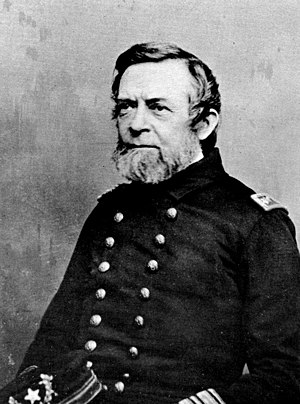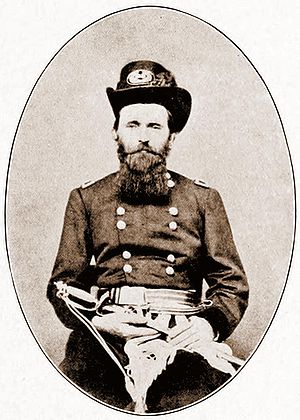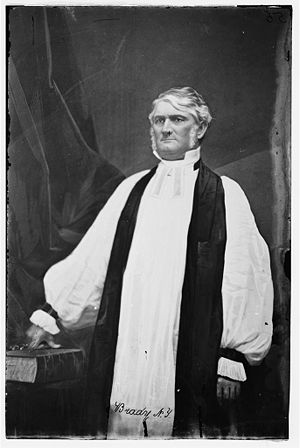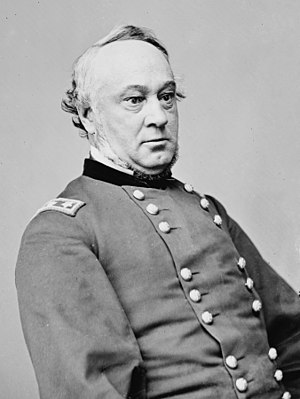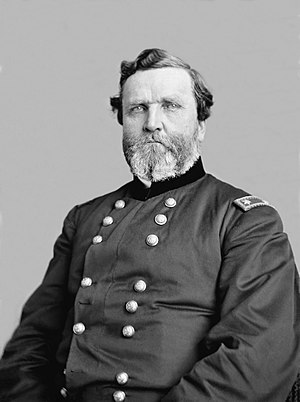On Saturday, August 10, 1861, the Battle of Wilson's Creek was fought in southwestern Missouri.
Missouri had been a busy place during the opening months of the Civil War. Union Brigadier General Nathaniel Lyon had done much to keep Missouri in the Union, including driving secessionist-minded Governor Claiborne Jackson out of the capital and routing the state militia at the Battle of Boonville.
Now Lyon was in a precarious situation. He had pursued the militia to the southwest corner of the state, but they had been reinforced by Confederate troops -- mostly Texans and Arkansans -- under General Ben McCulloch, and now outnumbered his force 2-to-1. Lyon was now twenty miles past his advance base of Springfield and suddenly realized that he could not advance, hold his ground, or even retreat without reinforcements, but his superior, John Frémont, had very few men to send him.
The commander of the state militia, Sterling Price, saw Lyon's predicament and tried to get McCulloch to attack, but the Confederate general demurred. McCulloch had a low opinion of Price and his troops, and wasn't sure he should even be in Missouri at all. The Confederate government did not want to wage war on foreign soil, which included Missouri. McCulloch and Price argued, and Price finally told him, "You must either fight beside us or look on at a safe distance and see us fight all alone the army you dare not attack even with our aid."
Price finally won the argument and McCulloch ordered the combined Confederate/Missouri/Arkansas army to move to attack Lyon on the night of August 9. But it rained that night and McCulloch cancelled the attack.
Lyon, meanwhile, decided that the best defense is a good offense, and launched his own attack, relying on surprise to overcome his lack of numbers.
In
Terrible Swift Sword, historian Bruce Catton offers a lengthy, but entertaining summary of the armies involved in the Battle of Wilson's Creek:
"It was an odd sort of army, wholly representative of its time and place. Lyon had, to begin with, a handful of regular infantry and artillery, tough and disciplined, full of contempt for volunteers, home guards, and amateur soldiers generally, whether Union or Confederate. He also had several regiments of Missouri infantry, principally German levies from St. Louis, short of equipment and training, most of them grouped in a brigade commanded by Franz Sigel. Sigel was an émigré from the German revolutionary troubles of 1848, trained as a soldier, humorless, dedicated, unhappily lacking in the capacity to lead soldiers in action; a baffling sort, devoted but incapable, who induced many Germans to enlist but who was rarely able to use them properly after they had enlisted. There were two rough-hewn regiments from Kansas and there was a ninety-day outfit from Iowa, a happy-go-lucky regiment whose time was about to expire but whose members had agreed to stick around for a few days in case the general was going to have a battle. (The Iowans did not like Lyon at all but they trusted him, considering him a tough customer and competent.) There were also stray companies and detachments from here and there whose numbers were small and whose value was entirely problematic. In miniature, this was much like the Union army that had been so spectacularly routed at Bull Run except that it was even less well equipped and disciplined.
"Yet if this army was odd the army which it was about to fight was ever so much odder -- one of the very oddest, all things considered, that ever played a part in the Civil War. Lyon's army would have struck any precisionist as something out of a military nightmare, but it was a veritable Prussian guard compared to its foes. The Southerners were armed with everything from regulation army rifles to back-country fowling pieces, a few of them wore Confederate gray but most of them wore whatever homespun garments happened to be at hand when they left home, and for at least three fourths of them there were no commissary and quartermaster arrangements whatever. The various levies were tied together by a loose gentleman's agreement rather than by any formal military organization, and many of the men were not Confederates at all, owing no allegiance to Jefferson Davis, fighting for Missouri rather than for the Confederacy. The war was still a bit puzzling, in these parts.
"The core of this army (from a professional soldier's viewpoint, at any rate) was a brigade of some 3200 Confederate troops led by Brigadier General Ben McCulloch, veteran of the Mexican War and one-time Texas Ranger, an old pal of Davy Crockett who looked the part, an officer who liked to sling a rifle over his shoulder, get on his his horse, and do his scouting personally. His men were well armed, most of them wore uniforms, and they had had about as much military training as anybody got in those days -- enough to get by on, but nothing special. There were also 2200 state troops from Arkansas, one cavalry and three infantry regiments led by Brigadier General N. B. Pearce. These men had good weapons but no uniforms and little equipment -- they carried their ammunition in their haversacks for want of better containers -- and they brought along two batteries of artillery, guns which until quite recently had been reposed in the United States arsenal at Little Rock. And, in addition, there was the Missouri State Guard under Major General Sterling Price.
"No one quite knew how many men Price had -- between 9000 and 10,000, probably, of which number only about 7000 could be used in action; the rest had no weapons at all. There were a few regimental organizations, but for the most part the formations were nothing more than bands bearing the names of the men who led them -- Wingo's infantry, Kelly's infantry, Foster's infantry, and so on. The men had no tents, no supplies, no pay, hardly any ammunition and nothing whatever in the way of uniforms; an officer could be distinguished by the fact that he would have a strip of colored flannel on his shoulders, and one of the men described General Price himself with the words: "He is a large fine looking bald fellow dressed in common citizen clothes an oald linen coat yarn pants." None of them had been given anything which West Point would have recognized as drill; one group, led by former country lawyers, was called to quarters daily by the courtroom cry of "Oyez! Oyez!" and customarily addressed its commanding officer as "Jedge." Not even in the American Revolution was there ever a more completely backwoods army; these men were not so much soldiers as rangy characters who had come down from the north fork of the creek to get into a fight. Their commissary department consisted of the nearest cornfield, and their horses got their forage on the prairie; and a veteran of the State Guard wrote after the war that any regular soldier given command of the host would have spent a solid six months drilling, equipping, organizing, and provisioning it, during which time the Yankees would have overrun every last county in Missouri once and for all. He added that although Price's men had very poor weapons -- some of them actually carried ancient flintlocks -- they knew very well how to use them, and they did not scare easily."
Sigel convinced Lyon to try a pincer movement. Lyon would split his outnumbered army, sending Sigel with 1200 men on a night march around McCulloch's army to attack his rear. Lyon, meanwhile, would march straight ahead with the remainder of the army and attack McCulloch's center and left. Everyone was in position at daybreak and the battle began.
Sigel's movement took the Confederates by surprise, driving them back, but a case of mistaken identity ruined the attack. A unit in gray uniforms approached Sigel's position. They were thought to be the 1st Iowa from Lyon's command, but turned out to be a Louisiana regiment. They closed and fired a volley that disintegrated Sigel's forces. An artillery barrage and an infantry counterattack sealed the deal. Sigel's force broke and fled.
Once Sigel's flanking move dissolved, the battle turned into a bloody, head-on attack that lasted most of the morning.
Lyon was wounded twice and had a horse shot out from under him, but he found another horse and was attempting to rally his men when he was shot through the heart. The battle gradually petered out and the Federals disengaged from the fight. They soon discovered that their highest ranking officer on the field was Major Samuel D. Sturgis of the regulars. Sturgis took command and led the army back to Springfield.
Both sides suffered about the same number of casualties -- a little over 1300 for the Federals (25% of the total present) and just over 1200 for the Confederate/Missouri/Arkansas force.
The Federals would retreat to Rolla. Price tried to get McCulloch to pursue, but he refused, concerned about his own supply line back to Arkansas. The Confederate and Arkansas troops would withdraw from the state, leaving Price to go it alone. Price would begin an invasion of northern Missouri, culminating in the Battle of Lexington on September 20.
While Price's reputation soared, Frémont's plummeted. He seemed to have lost half the state in the short time he was in command.
 Image via Wikipedia
Image via Wikipedia
